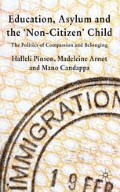Abstract
In his review of citizenship in the UK for the Labour government, Lord Goldsmith (Ministry of Justice, 2008: 115) asserted that: ‘We have been open in this country to allowing people to acquire citizenship, even if they were not born in the UK or have no ancestral connection to the UK.’ For this to happen, the report argued, the ‘non-citizen’ should not only learn English but also learn how to ‘become British’ — to acquire ‘a knowledge of the British way of life’. However, with little prospect of ever reaching the specially provided citizenship test or the much-vaunted citizenship ceremony, there are unlikely to be many opportunities for asylum-seeking students to feel that they could or would belong to British society.
Access this chapter
Tax calculation will be finalised at checkout
Purchases are for personal use only
Preview
Unable to display preview. Download preview PDF.
Author information
Authors and Affiliations
Copyright information
© 2010 Halleli Pinson, Madeleine Arnot and Mano Candappa
About this chapter
Cite this chapter
Pinson, H., Arnot, M., Candappa, M. (2010). Britishness and Belonging. In: Education, Asylum and the ‘Non-Citizen’ Child. Palgrave Macmillan, London. https://doi.org/10.1057/9780230276505_9
Download citation
DOI: https://doi.org/10.1057/9780230276505_9
Publisher Name: Palgrave Macmillan, London
Print ISBN: 978-1-349-35714-7
Online ISBN: 978-0-230-27650-5
eBook Packages: Palgrave Social Sciences CollectionSocial Sciences (R0)

